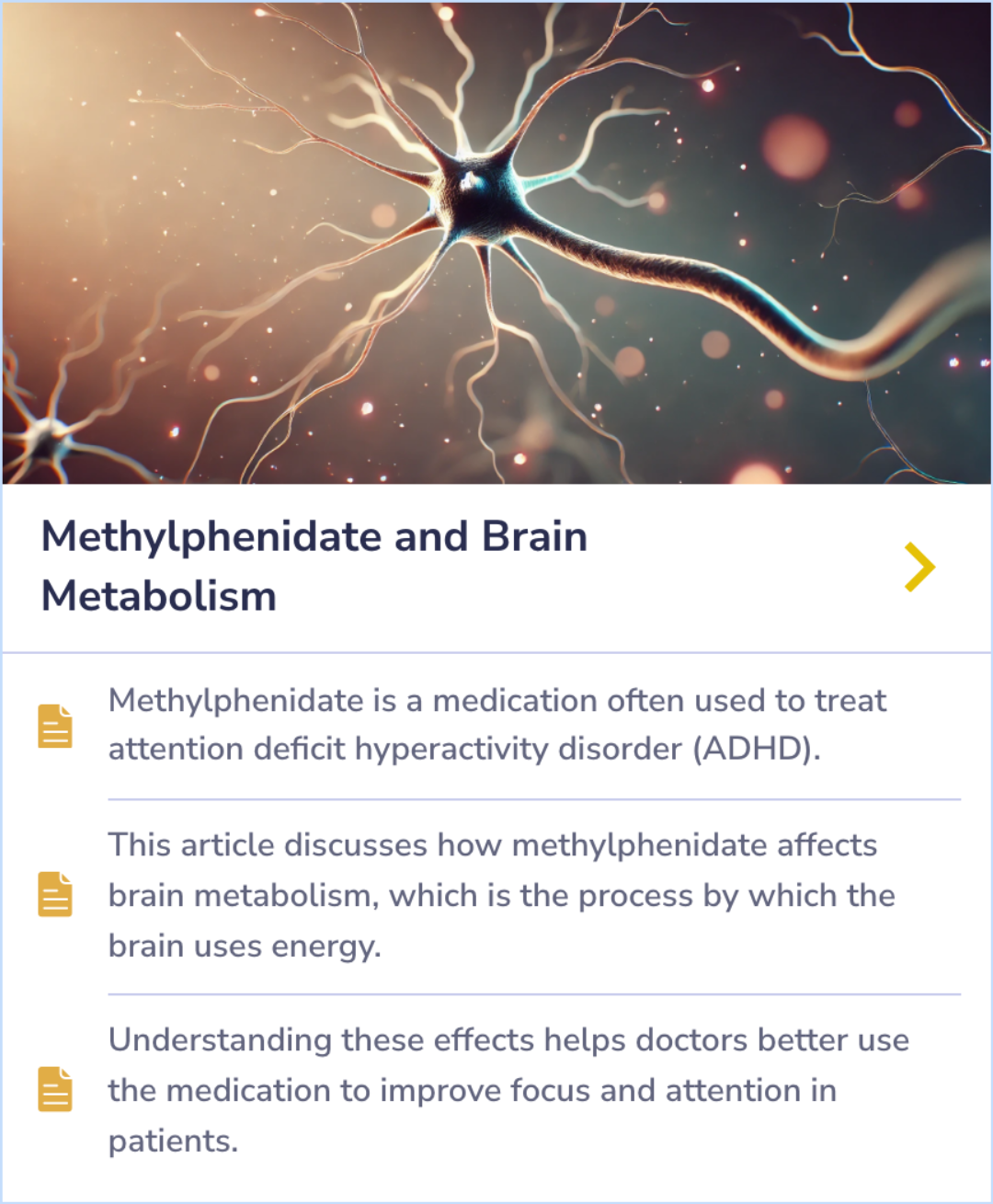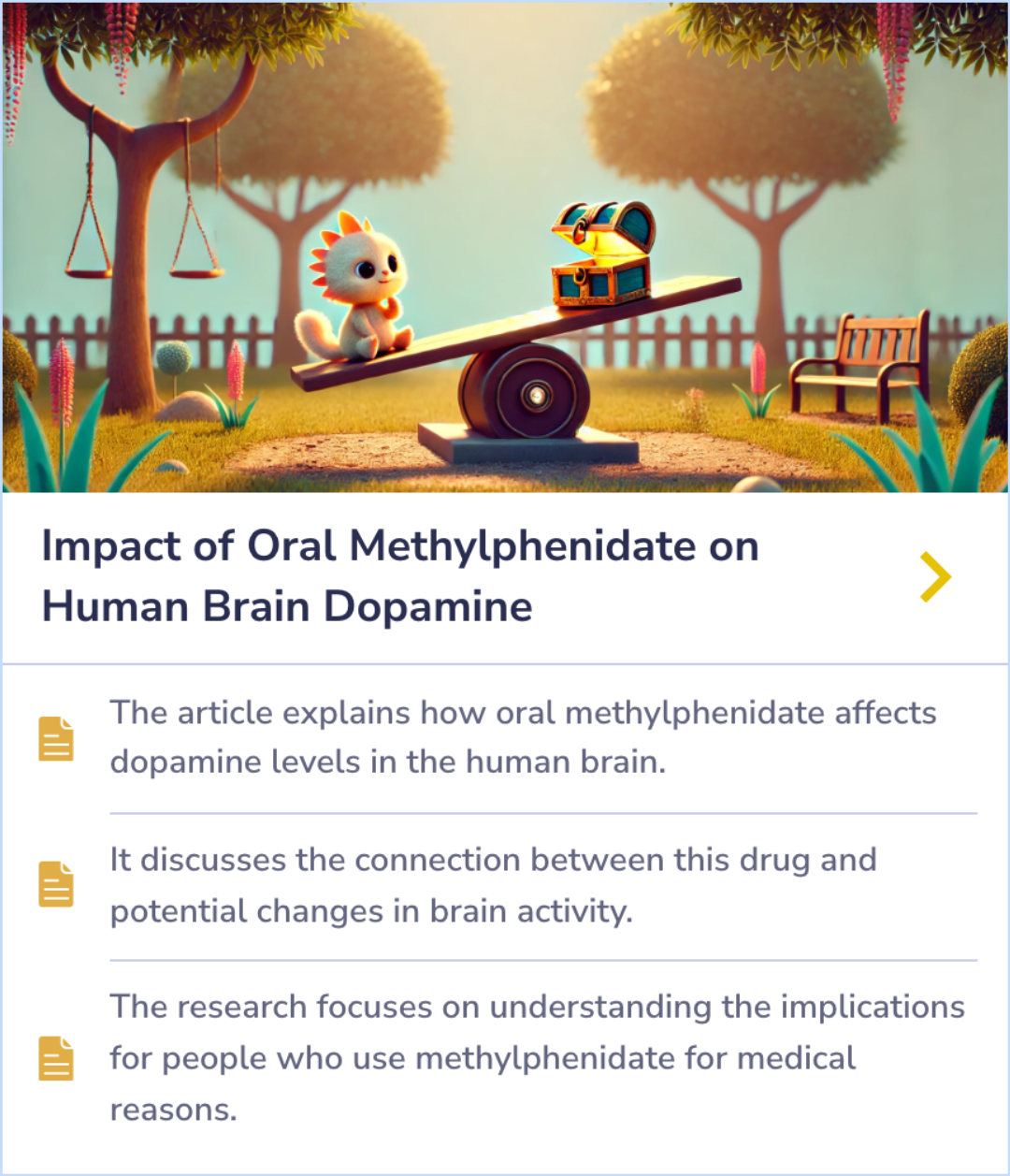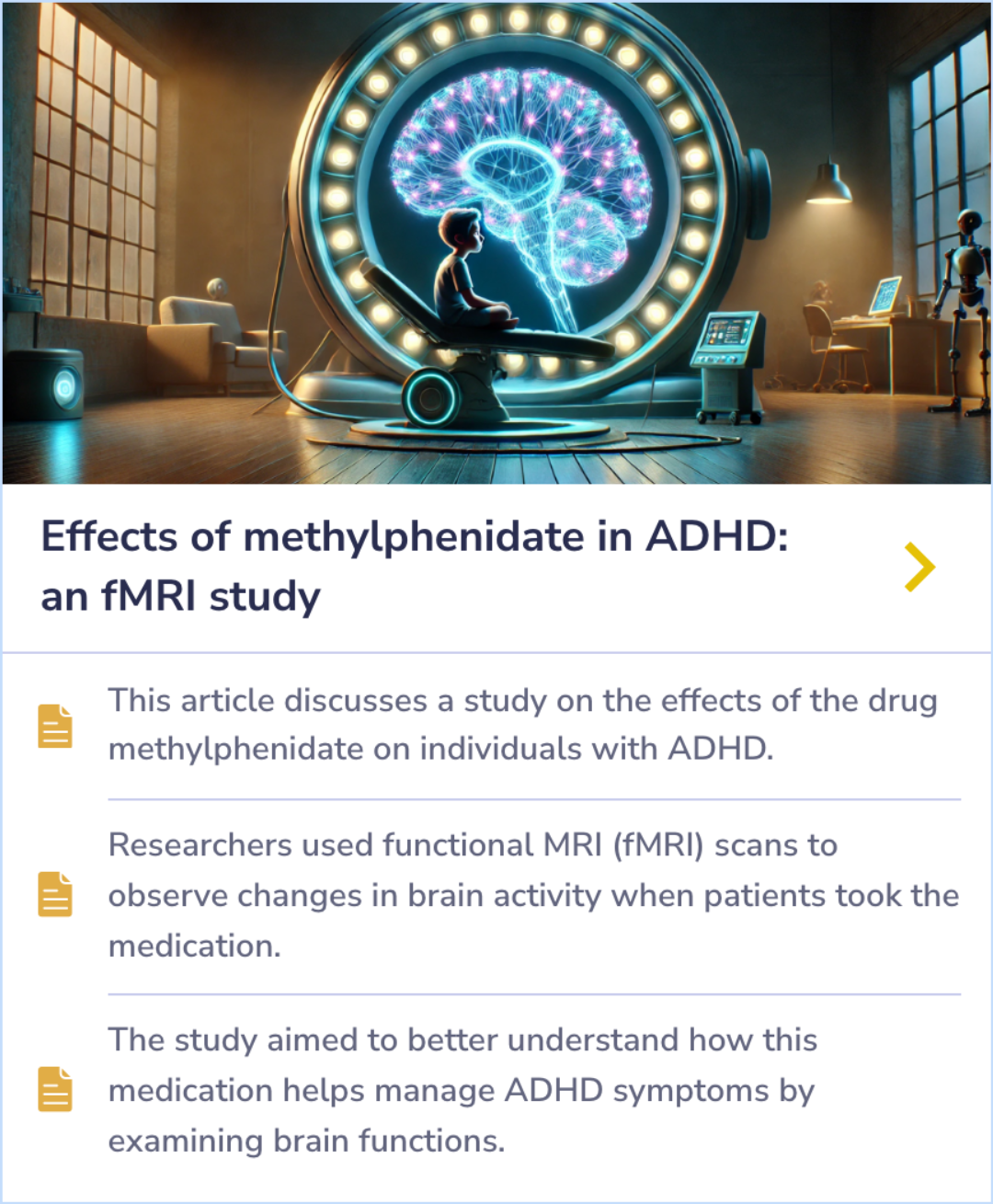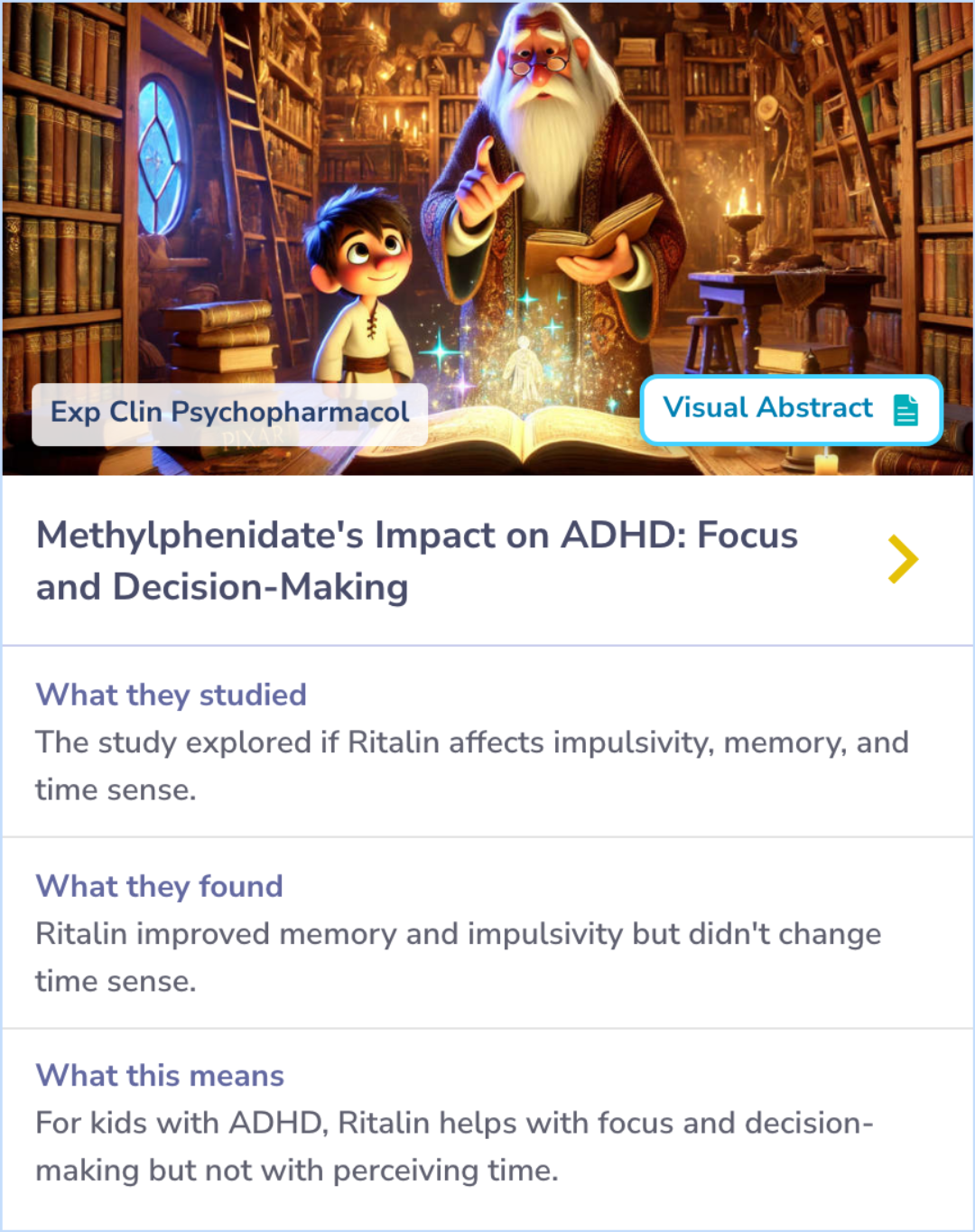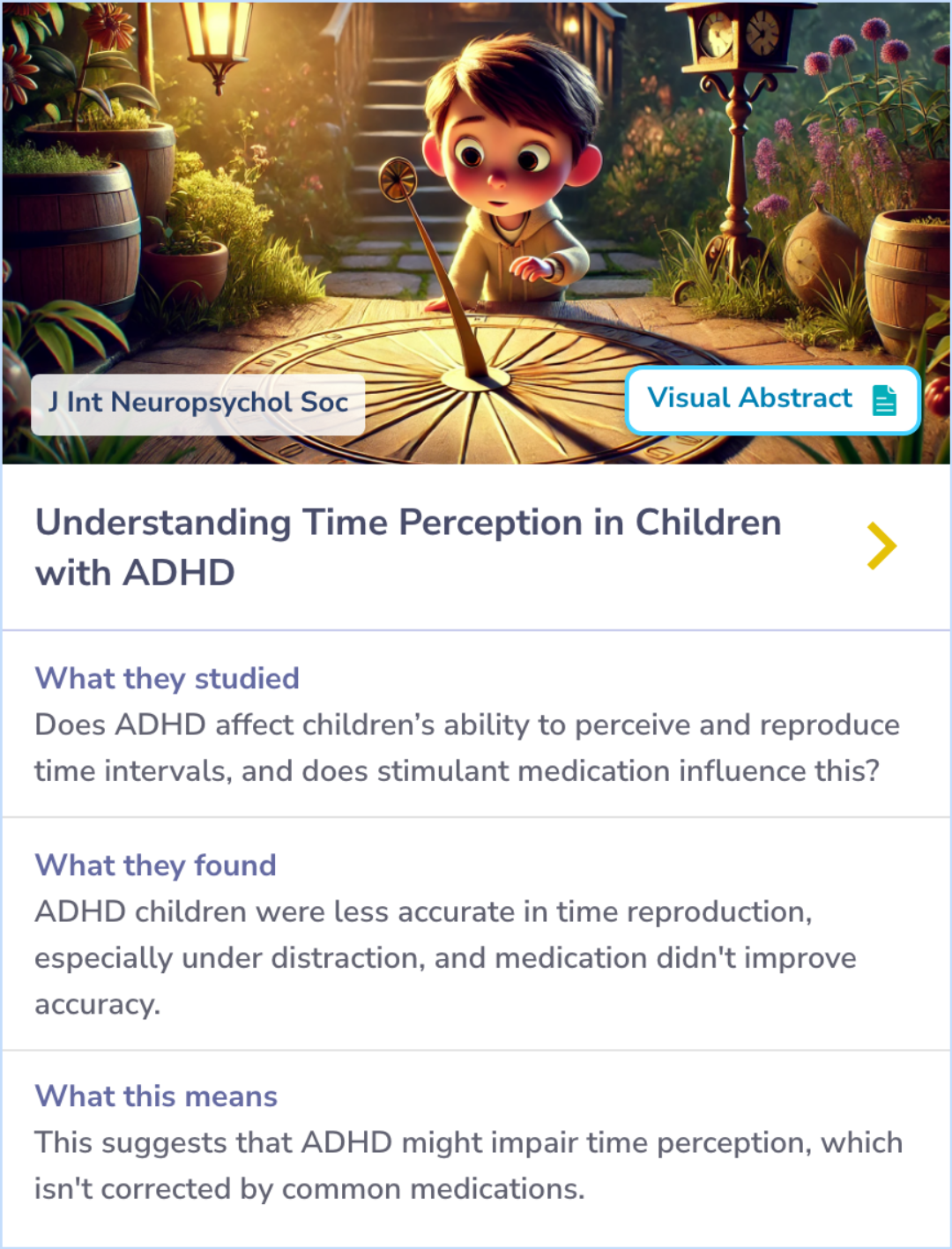Ritalin
Evidence Based Answers
Which parts of the brain does Ritalin affect?
Ritalin impacts dopamine levels in brain areas linked to reward, focus, and impulse control, targeting regions like the striatum and prefrontal cortex to help manage ADHD symptoms.
Published: October 25, 2024
Click to explore a section:
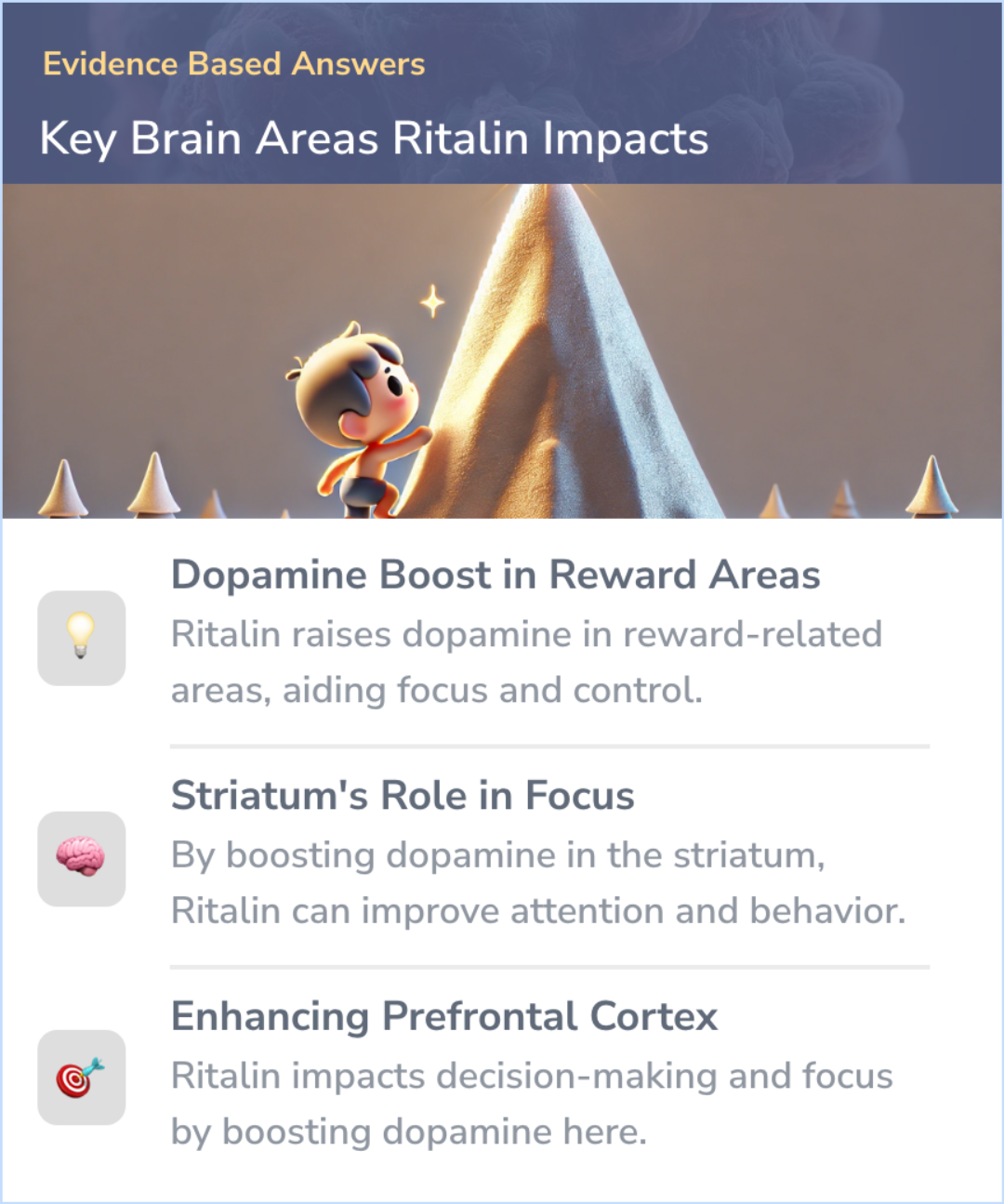
Ritalin increases dopamine in the striatum, prefrontal cortex, and reward centers, aiding focus, decision-making, and behavioral control for ADHD management.
Studies Summary
🧠
How Ritalin increases dopamine in the brain
Ritalin works by blocking the reuptake of dopamine, increasing its levels in key brain regions like the striatum and nucleus accumbens. This helps improve focus and reduce impulsive behaviors in individuals with ADHD.
🏃♂️
Ritalin's impact on the striatum and motor function
The striatum, a region involved in motor functions and reward, experiences increased dopamine levels due to Ritalin, which can normalize activity and reduce hyperactive behaviors.
🧩
Ritalin's role in enhancing cognitive functions
Ritalin affects the prefrontal cortex by boosting dopamine and norepinephrine, enhancing cognitive functions like attention, decision-making, and impulse control in individuals with ADHD.
How Ritalin Impacts Dopamine Levels in the Brain
Ritalin, commonly prescribed for ADHD, works by blocking the reuptake of dopamine in the brain. This increases dopamine levels in regions like the striatum and nucleus accumbens, which are involved in attention and reward processing.
By increasing dopamine in these areas, Ritalin helps improve focus and reduce impulsive behaviors, which are key symptoms of ADHD.
By increasing dopamine in these areas, Ritalin helps improve focus and reduce impulsive behaviors, which are key symptoms of ADHD.
“
Source Quotes:
Methylphenidate binds to the dopamine transporter in the presynaptic cell membrane, blocking reuptake of dopamine and causing a resultant increase in extracellular dopamine levels.
The Striatum's Role in Ritalin's Effects
The striatum is a brain region involved in regulating motor functions and reward. Ritalin increases dopamine levels in the striatum, which can help normalize activity in this area.
This normalization may improve attention and reduce hyperactive behaviors in individuals with ADHD.
This normalization may improve attention and reduce hyperactive behaviors in individuals with ADHD.
“
Source Quotes:
Methylphenidate has also been shown to increase striatal DA availability, as measured by reductions in ligand binding potential in PET studies.
Ritalin’s Impact on the Prefrontal Cortex
Ritalin also affects the prefrontal cortex, a region linked to cognitive functions like decision-making, attention, and impulse control. By increasing dopamine and norepinephrine levels here, Ritalin can enhance cognitive performance.
This may help individuals with ADHD manage tasks, focus on goals, and make more deliberate decisions.
This may help individuals with ADHD manage tasks, focus on goals, and make more deliberate decisions.
“
Source Quotes:
Methylphenidate blocks the reuptake of two neurotransmitters, norepinephrine (NE) and dopamine, mainly in the prefrontal cortex.
MPH increases activation of the parietal and prefrontal cortices during visual attention and working memory tasks.
Ritalin’s Effect on Motivation and Reward in the Brain
The nucleus accumbens is involved in the brain's reward system, which affects motivation and pleasure. Ritalin increases dopamine levels in this area, potentially helping to regulate these processes.
This regulation might reduce impulsive behaviors and improve motivation for goal-directed activities in individuals with ADHD.
This regulation might reduce impulsive behaviors and improve motivation for goal-directed activities in individuals with ADHD.
“
Source Quotes:
Methylphenidate increases dopamine in the nucleus accumbens, which is thought to underlie the reinforcing effects of drugs of abuse.
Microdialysis studies have confirmed the in vivo ability of methylphenidate to increase extracellular dopamine levels in the nucleus accumbens.
Balancing Cognitive and Behavioral Effects of Ritalin
Ritalin influences multiple brain regions, including the striatum, prefrontal cortex, and nucleus accumbens. Each of these areas plays a role in different aspects of cognitive and behavioral function, such as attention, decision-making, reward, and motivation.
By increasing dopamine and norepinephrine levels in these regions, Ritalin may help balance cognitive function and behavior in individuals with ADHD.
By increasing dopamine and norepinephrine levels in these regions, Ritalin may help balance cognitive function and behavior in individuals with ADHD.
“
Source Quotes:
MPH-induced increases in DA and NE availability affect corticostriatal systems that subserve behaviors related to cognition and executive function.
Methylphenidate’s therapeutic effects may be associated with its influence on multiple neurotransmitters, especially the release and reuptake of dopamine in the striatum.
Key Takeaways
Conclusions
Ritalin primarily affects the brain's striatum, prefrontal cortex, and nucleus accumbens by increasing dopamine and norepinephrine levels in these areas.
This increase in neurotransmitters helps regulate attention, decision-making, motivation, and reward processing, all of which are crucial for managing symptoms of ADHD like impulsivity and hyperactivity.
By targeting these key brain regions, Ritalin aids in balancing cognitive and behavioral functions, leading to improved focus and controlled behavior in individuals with ADHD.
This increase in neurotransmitters helps regulate attention, decision-making, motivation, and reward processing, all of which are crucial for managing symptoms of ADHD like impulsivity and hyperactivity.
By targeting these key brain regions, Ritalin aids in balancing cognitive and behavioral functions, leading to improved focus and controlled behavior in individuals with ADHD.

Evidence Summary
How Methylphenidate Influences Brain Metabolism
Methylphenidate, often known as Ritalin, is a medication frequently used to treat ADHD. It impacts how the brain uses energy, which this article explains in detail. By understanding these effects, doctors can better use the medication to improve patients' focus and attention.
This helps in optimizing treatment strategies, targeting how the medication influences the brain's energy usage to aid in better focus and attention.
This helps in optimizing treatment strategies, targeting how the medication influences the brain's energy usage to aid in better focus and attention.
Evidence Summary
How Oral Methylphenidate Impacts Dopamine and Brain Activity
Taking methylphenidate affects dopamine levels in the brain, leading to changes in brain activity. These changes can influence various cognitive and behavioral functions, particularly in people using the medication for medical reasons.
The article examines the connection between methylphenidate and potential shifts in brain activity, highlighting the effects this medication has on its users.
The article examines the connection between methylphenidate and potential shifts in brain activity, highlighting the effects this medication has on its users.
Evidence Summary
fMRI Scans Show How Ritalin Affects Brain Activity
fMRI scans reveal how Ritalin alters brain activity in people with ADHD, helping to manage symptoms. The study used brain imaging to observe functional changes, showing the drug's impact on regions involved in attention and impulse control. These insights shed light on the drug's role in symptom management.
The findings highlight how Ritalin influences brain function, contributing to a better understanding of its effects on ADHD symptoms.
The findings highlight how Ritalin influences brain function, contributing to a better understanding of its effects on ADHD symptoms.
Evidence Summary
Ritalin Enhances Impulsivity and Memory but Not Time Perception in ADHD
Individuals with ADHD prefer immediate rewards over larger ones that require waiting. This study examined the effect of Ritalin on impulsivity, working memory, and time perception in children with ADHD. Thirty-five children took computerized tests after a placebo and after taking Ritalin for two weeks.
Results show Ritalin improves impulsivity and working memory but doesn't affect how children perceive time. Interestingly, improvements in impulsivity aren't linked to improvements in working memory.
Results show Ritalin improves impulsivity and working memory but doesn't affect how children perceive time. Interestingly, improvements in impulsivity aren't linked to improvements in working memory.
Evidence Summary
ADHD and Time Perception: Distraction and Ritalin's Effects
Children with ADHD struggle more than their peers in accurately reproducing time intervals, especially when distracted. In experiments, ADHD children showed significant inaccuracies over various time spans and distractions. While their performance worsened with longer intervals, taking Ritalin did not improve their ability to reproduce time accurately.
